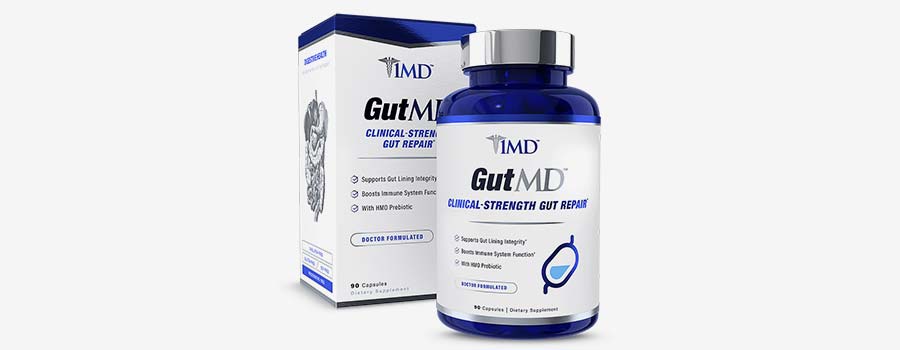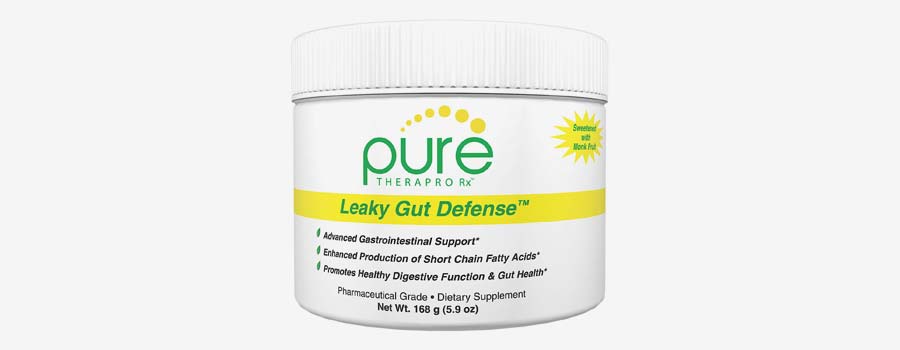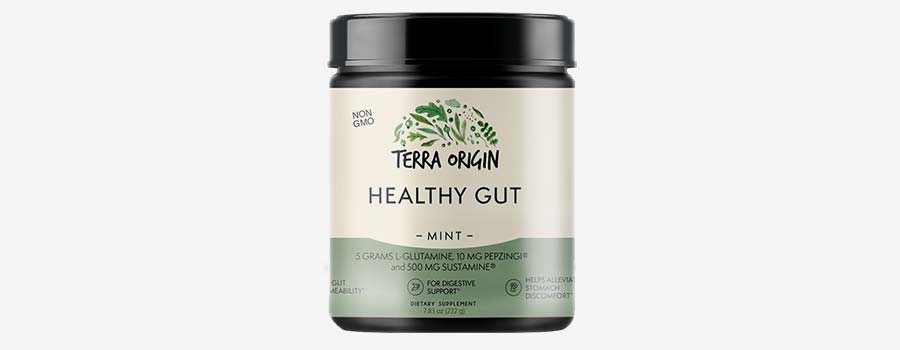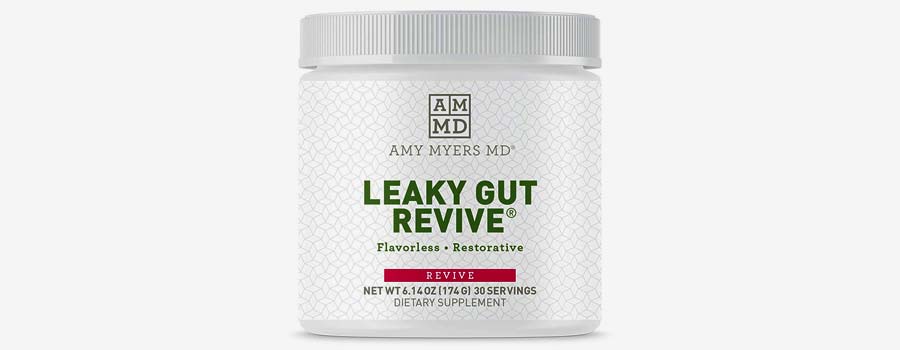The ultimate leaky gut syndrome guide features the top 10 best leaky gut supplements in 2024 that are designed to promote optimal gut health and microbiome wellness.
The leaky gut syndrome phenomena has become an increasingly popular buzzword over the last handful of years due to popular medical doctors who sell supplements like Dr. Steven Gundry, MD or Dr. Vincent Pedre, Dr. Amy Myers MD or Dr. Josh Axe all promoting ways to naturally fix leaky gut symptoms.
But rather than simply shoving supplement recommendations down your throat, Advanced Living wanted to go above and beyond in our ultimate leaky gut supplementation guide to not only review the most popular leaky gut products, but map out the entire emerging health condition as a whole. The topic is of vital importance and significance to your well-being. There's so much to digest in regards to leaky gut that listing the best supplements was not going to be enough. To showcase and highlight the need for leaky gut support aids requires much more research and investigation than embedding a widget of suggested products to try. Instead of just revealing these leaky gut supplements, we reviewed each one:
Since these prominent online doctors have started pushing the conceptual theory of increased intestinal permeability, there's been a lot of misinformation about leaky gut syndrome (LGS) floating around the Internet. Some argue that it's not a real medical condition, is merely a hypothetical fad diagnosis that has nothing to do with the gut flora ecosystem. Others argue it's a devastating illness that has serious health consequences on whole body wellness as most sickness originates from the stomach and its inherent digestive processes.
The gut microbiome, which is comprised of trillions of bacteria, fungi, viruses and protozoa, is an aggregate of all the human tissue and biofluid microbiota and acts as the biggest immune system organ in the body. It is also the number one way in how our bodies interact with the outside world when it comes to extracting nutrition from food consumption.
The gut contains the most number of cells related to immunity and makes up nearly 70% of all lymphoid tissues in the body (the lymphatic system is the metabolic trash can of the body and is responsible for flushing and eliminating toxic waste and excess metabolism byproducts). Once the gut's lining health becomes compromised, the small intestinal wall gets inflamed, damaged or porous (leaky), allowing for harmful bacteria and toxins to “leak” due to impaired intestinal barrier function (here).
This is what causes leaky gut syndrome. LGS is considered a highly-problematic digestive condition where the intestinal wall's strength status is in jeopardy and can not stop detrimental foreign metabolic materials and compounds from entering the body's gastrointestinal system. The GI tract creates a tight barrier that controls how much gets absorbed into the bloodstream as the quality of absorbable nutrients directly correlates and supports the body's overall energy production levels.
Leaky gut's undesirable effects can wreck havoc on the body's digestion processes and weaken immunity that could trigger serious adverse reactions and autoimmune disorders. The leaky gut syndrome symptoms can range from the obvious digestive complaints (gas, bloating, congestion) to obesity to acid reflux or irritable bowel syndrome (IBS), as well as Crohn's disease, food allergies, arthritic joint and muscle pain, anxiety, headaches, ADHD or even skin conditions such as acne, psoriasis, rosacea, rashes and eczema. It is safe to say when the gut microbiome's (your internal garden) balance is out of whack, all kinds of subpar wellness side effects can set in and take control of your body's well-being.
From diet-induced gut leakiness to stress-induced gut leakiness, leaky gut syndrome has become the hot catchphrase in the medical community for being the hidden cause of many chronic diseases all pertaining to non-optimal gut health lining. It is estimated 4 out of 5 people dealing with chronic ailments have leaky gut syndrome where it is essentially an overgrowth of bad bacteria who outnumber the good bacteria living in your gut and stomach tissues.
While the focus is to review the top 10 best leaky gut supplements of 2024 as working natural solutions to implement for gut health improvement, there are pressing questions we cover in our ultimate leaky gut syndrome guide too. From answering what is Leaky Gut Syndrome to covering how do you repair leaky gut syndrome, many are researching whether or not you can assist your stomach's defense system against LGS with natural supplementation options?
As the saying goes, an ounce of prevention is worth a pound of cure and being proactive with these proven leaky gut supplements (and the ingredients list) can provide extra protection in the fight against LGS symptoms. The guide will also cover foods to avoid for leaky gut, a diet plan to follow and what the current science says about leaky gut syndrome.
Contents
Is Leaky Gut Syndrome Real?
A leaky gut, also known as increased intestinal permeability, is a digestive condition where your bacteria and toxins can leak through the intestinal wall.
Medical professionals do not recognize Leaky Gut as a real condition, and Leaky Gut Syndrome is not recognized as a legitimate illness.
Despite what doctors say, there is scientific evidence that Leaky Gut Syndrome exists. There’s also evidence linking Leaky Gut Syndrome to multiple health problems.
What is Leaky Gut?
Leaky Gut originates in the digestive tract. Your digestive tract breaks down foods and absorbs nutrients.
Your digestive system also plays a crucial role in your body’s immune system. It protects your body from harmful substances. The walls of your intestines act as barriers. They control what enters the bloodstream to be transported to your organs.
However, your digestive system isn’t perfect. Sometimes, small gaps in the intestinal wall can allow water and nutrients to pass through without being absorbed. These gaps are called tight junctions. Tight junctions not only block the absorption of nutrients, but they also block the passage of harmful substances.
In other words, tight junctions in your intestinal tract allow good things, like water and nutrients to pass by without being absorbed, but it allows bad things like toxins, to remain in your digestive tract.
Due to intestinal permeability, substances pass through your intestinal wall and enter your body.
When the tight junctions of your intestinal walls become loose, however, the gut becomes more permeable, allowing bacteria and toxins to pass from the gut into the bloodstream. This is called Leaky Gut.
When your body is working optimally, your digestive tract absorbs good substances while harmful substances pass through. If you have a Leaky Gut, however, the opposite may occur.
When your body absorbs toxins, it can cause widespread inflammation and trigger a reaction from the immune system. One viable solution many turn to is the use of high quality leaky gut supplements from reputable companies who make integrity their priority.
Reviewing the Top 10 Best Leaky Gut Supplements of 2024
Leaky gut syndrome can be tough and be one of the biggest catalysts for poor health and subpar energy levels. Fortunately, there are more leaky gut supplements available today than ever before. A growing number of supplement companies now offer supplements that support digestive health, reduce intestinal permeability, and target other symptoms of leaky gut syndrome. However, as common sense should equate, not all leaky gut supplements are created equally.
We researched, reviewed and ranked each of the top leaky gut products that can produce the best results and help provide your stomach's gut flora microbiome ecosystem the proper nutrition, protection and optimization it needs in the fight against bad bacteria, viruses and toxic stomach bugs.
1MD GutMD: Clinical-Strength Gut Repair
1MD GutMD is one of the best-known leaky gut supplements on the market. The formula combines four clinically-studied ingredients into one convenient capsule. You take the supplement daily to, according to the manufacturer, “eliminate harmful pathogens, strengthen the gut barrier, and soothe the stomach and intestinal lining while improving the health of your gut and providing critical immune system support.” In other words, this supplement does it all.
The four active ingredients in GutMD include L-Glutamine (1500mg per 3 capsule serving), CARE4U human milk oligosaccharides (250mg), Gutgard licorice root extract (150mg), and Fibregum acacia fiber (60mg). All four ingredients are packaged into a vegetable cellulose capsule with vegetable oil powder.
GutMD is available online through 1MD.org, where bottles are priced between $42 and $50 (depending on how many you buy).
Click here for the best price on 1MD GutMD
Liver Medic Leaky Gut Repair
Liver Medic’s Leaky Gut Repair supplement is one of the top selling leaky gut supplements on Amazon. The supplement promises to relieve heartburn, bloating, gas, and constipation using ingredients like L-glutamine, slippery elm, zinc, and NAG. These ingredients, according to Liver Medic, “support restoration of damaged gut lining (leaky gut) caused by environmental factors such as toxins, pathogens (bacteria), acidic drinks, and pharmaceuticals)”.
One of the reasons Leaky Gut Repair is popular is its price: at just $23.99 for a one month supply (60 capsules / 30 servings), it’s one of the more affordable leaky gut repair supplements on our list.
Click here for the best price on Liver Medic Leaky Gut Repair
Pure Therapro Rx Leaky Gut Defense
Leaky Gut Defense is the first supplement on this list to come in the form of a bulk powder – not a capsule. You mix the powder with water (or the beverage of your choice) to support your gut lining. Key ingredients in the formula include 3g of L-glutamine, licorice root, and aloe leaf. The ingredients are designed to soothe and strengthen your digestive system, reducing the leakiness of your gut.
Unlike many other leaky gut supplements, Leaky Gut Defense is sweetened with monk fruit – not ingredients like stevia. In addition to targeting symptoms of leaky gut syndrome (also known as dysbiosis), the supplement claims to target food allergies, food sensitivities, IBS, weight issues, gas, bloating, bowel issues, and more.
Amazon sells a 30 serving tub for $41, although a larger 60 serving tub is also available for around $60.
Click here for the best price on Pure Therapro Leaky Gut Defense
Terra Origin Healthy Gut
Hauppauge, New York-based supplement company Terra Origin has launched a lineup of digestive health supplements called Healthy Gut. Available in four flavors (peach banana, fennel, berry, and mint), Healthy Gut claims to support a healthy digestive tract. The formula includes vitamins and herbs that support the digestive system and improve the gut lining. There’s also an antioxidant mix to neutralize free radicals.
Other key ingredients include zinc, L-glutamine, N-Acetyl D-Glucosamine, licorice root extract, slippery elm bark powder, marshmallow root powder, and MSM.
You can buy Terra Origin Healthy Gut in convenient on-the-go packets (just mix and go). Or, you can buy a bulk container at a small discount. The 30 pack of packets is priced at $30, while the bulk container is priced at $27.
Click here for the best price on Terra Origin Healthy Gut
Thorne Research Perma-Clear
Thorne Research Perma-Clear supplement claims to support a healthy intestinal lining using ingredients like L-Glutamine and probiotics. It’s priced at $74 for 180 capsules (60 servings) on Amazon, which is a similar price-per-serving to most other leaky gut supplements on this list.
Each three capsule serving of Perma-Clear includes 900mg of L-Glutamine, 750mg of N-Acetylglucosamine, 112.5mg of a phospholipid complex from sunflower, 75mg of Bacillus coagulans (a probiotic), and 30mg of ginger extract. Thorne Research claims these ingredients reduce inflammation, affect gut permeability, and promote the growth of beneficial gut flora, all of which can reduce symptoms of leaky gut syndrome.
Thorne Research is based in Dover, Idaho. It’s also one of the oldest supplement manufacturers on this list, founded all the way back in 1984.The company makes a range of science-backed supplements, selling them mostly through Amazon.
Click here for the best price on Throne Perma-Clear
Designs for Health GI-Revive
Designs for Health makes a leaky gut supplement called GI-Revive. The supplement claims to offer “optimal gastrointestinal support” by supporting the gut lining and promoting digestive regularity. Each 210 capsule (30 serving) bottle is priced at $85 on Amazon, making this one of the most expensive leaky gut supplements on our list. You take 7 capsules per serving.
As you might expect at this higher price range, GI-Revive is packed with high doses of multiple gut health ingredients. There’s 1,500mg of L-Glutamine in each serving, for example, along with 1,000mg of N-Acetyl D-Glucosamine, 1,000mg of citrus pectin, 400mg of licorice extract, 300mg of aloe very extract, 200mg of slippery elm extract, and 100mg of marshmallow extract, among other ingredients. There are also ingredients like prune powder (100mg per serving) to promote digestive regularity.
Overall, GI-Revive is one of the priciest options on this list, although it backs up the high price tag with a lengthy list of ingredients at strong dosages.
Click here for the best price on Designs for Health GI-Revive
Dr. Amy Myers Leaky Gut Revive
Dr. Amy Myers is a real doctor who has launched a lineup of health supplements under the AMMD / Amy Myers MD name. Leaky Gut Revive claims to reduce symptoms of a leaky gut by restoring your gut lining, thereby reducing bloating, gas, indigestion, IBS, and more.
Leaky Gut Revive comes in a jar of bulk powder. You mix the powder with the beverage of your choice – Dr. Myers recommends water, juice, or a smoothie first thing in the morning (the powder is flavorless and can be mixed with pretty much anything). By taking it daily, you can “naturally maintain healthy gut lining”, according to Dr. Myers.
Leaky Gut Revive has a surprisingly powerful formula, with dosages that seem comparable to some of the most powerful leaky gut supplements on this list. Each scoop (5.8g, 30 scoops per container) has 3,000mg of L-Glutamine along with 2,750mg of a proprietary blend containing marshmallow root powder, licorice root powder, slippery elm bark powder, and aloe vera leaf powder. There are no other ingredients – there aren’t even fillers, binders, or other ingredients to join the supplement together.
Click here for the best price on Dr. Amy Myers Leaky Gut Revive
Codeage Gut Health Formula
Codeage’s Gut Health Formula claims to offer “total support” for your digestive health with ingredients like L-Glutamine, licorice root extract, marshmallow root extract, probiotics, and prebiotics. By taking the supplement daily, Codeage claims you can support your gut lining and maintain good digestive tract health.
Each 180 capsule bottle (60 servings, 3 capsules per serving) is priced at $40 from Amazon, making this one of the more affordable supplements on our list.
The ingredients list for Gut Health Formula is packaged into three proprietary blends, including the Gut Integrity Blend (850mg), Tonic Mushroom, Micro Algae, and Mineral Blend (610mg), and Soil and Plant Based Probiotic and Prebiotic Blend (390mg). Each serving contains 10 billion CFUs of probiotics to support healthy gut bacteria.
Click here for the best price on Codeage Gut Health Formula
Vital Nutrients GI Repair Nutrients
Vital Nutrients makes a supplement called GI Repair Nutrients. It’s one of Amazon’s best-rated and top-selling leaky gut supplements. Priced at $45 for 40 servings, it’s priced about average compared to other supplements on our list. Vital Nutrients claims their formula can maintain good intestinal permeability and soothe the lining of your digestive tract using vitamins, minerals, and herbal extracts.
Key ingredients in GI Repair Nutrients include L-Glutamine, N-Acetyl Glucosamine (NAG), licorice root extract (DGL), and probiotics. As of February 2024, GI Repair Nutrients has a near-perfect rating of 4.8 stars out of 5 on Amazon.
Click here for the best price on Vital Nutrients GI Repair Nutrients
Dr. Axe Probiome RX Gut Formula
TV doctor Dr. Axe now sells several trendy supplements under different brand names, including Ancient Nutrition and Probiome RX. The Probiome RX Gut Formula is priced at $42 for 30 servings and contains 15mg of zinc, 850mg of a “Gut Integrity Blend” (with licorice root and L-Glutamine), 610mg of tonic mushroom, micro algae, and minerals, and 10 billion CFUs of probiotics.
Dr. Axe recommends taking three capsules per day with water or the beverage of your choice. The supplement purportedly supports digestive health and a healthy immune system, improves the lining of your gut, and provides other targeted benefits.
Click here for the best price on Dr. Axe Probiome RX Gut Formula
Do Leaky Gut Syndrome Supplements Really Work?
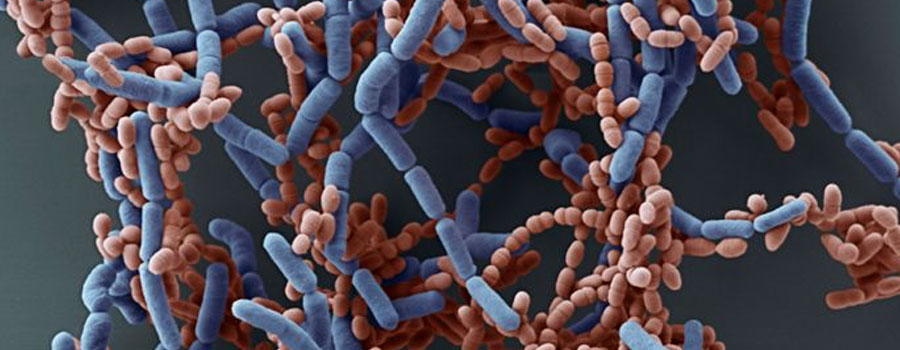
You don’t have to look far online to find supplements that claim to cure Leaky Gut Syndrome. We just rated and ranked ten of the best leaky gut supplements available online.
Unfortunately, to date, none of these supplements have been scientifically proven to work as advertised but that does not mean they are not effective or won't aid the body and gut health. Despite there is no specific connection between taking a supplement and improving your intestinal permeability, many are in agreement that adequate nutritional intake is one of the single best ways you can go about helping rid your body of LGS symptoms.
This study published in 2013, for example, tested one of the agents purported to improve the intestinal barrier after the barrier was affected by disease. Researchers concluded that the agent was ineffective:
“Advances have been made in understanding the cellular mechanisms of intestinal barrier loss in disease. Unfortunately, the only agent purported to restore the barrier failed to do so in clinical trials.”
Researchers did find, however, that certain therapeutic methods could improve Leaky Gut Syndrome symptoms:
“For now, the best therapy for barrier loss should target the disease itself. For example, anti-TNF [tumor necrosis factor] agents have been shown to restore barrier function in CD [Crohn’s disease] patients.”
For those that do not want to buy the top 10 best leaky gut products ranked above, there are wholesome ingredients in the form of vitamins, minerals, probiotics and herbal extracts you can seek out to use as well that are associated with improving gut health.
14 Supplement Ingredients for Leaky Gut Benefits

For consumers that want to heal their leaky gut, there are many ingredients that they need to integrate into their regimen to help if one of the products is not the right solution for you.
Collagen
Collagen is a form of protein, and it is the protein with the highest concentration in the body. It is typically found in between the joints and in the layers of the skin, though it also is part of the lining of the digestive tract. The production of this protein begins to decline after age 25, which is why its important to get this nutrient in the diet, which can be done with the use of supplements.
Collagen is comprised of multiple amino acids that the body needs, though these ingredients are sometimes listed separately in supplements. They include:
- Glycine, which helps the body to make glutathione to protect the cells and support the health of the brain and heart.
- Also a component of creatine.
- Proline, which supports joint tendon functioning.
- Is a non-essential amino acid.
- L-Glutamine, which supports intestinal health by regulating the metabolism and maintain the gut barrier.
- L-Arginine, which supports cardiovascular health, eliminates ammonia, and promotes the healthy release of insulin.
- Also promotes release of nitric oxide for relief of high blood pressure.
N-acetyl Glucosamine
N-acetyl glucosamine is known as one of the top ingredients to soothe a leaky gut, helping to eliminate the bad bacteria and promote the growth of healthy bacteria. Along with supporting the gut, glucosamine is also known for supporting bone and cartilage health, the immune system, and the production of probiotic strains that protect the gut. It is a necessary ingredient for the treatment of irritable bowel disorder.
Probiotics and Prebiotics
High-quality probiotic supplements are helpful in creating a diverse and balanced atmosphere for the microbiome. All these bacteria are healthy for the digestive system, while probiotics are a source of nourishment for the healthy bacteria to continue to thrive. With both of these substances in the digestive system, the toxic bacteria that can come from unhealthy foods can be eradicated.
Consumers that want to get this type of nourishment without a supplement can also find it in food, like licorice root, slippery elm, marshmallow root, mushrooms (reishi). To get the best support, consumers should try to get around 10 billion CFUs daily.
Vitamin D
Vitamin D was originally discovered about a century ago, but researchers are still learning about all the ways that it can benefit people today. During those discoveries, researchers found that the use of this vitamin is helpful for consumers that have a leaky gut, based on animal studies. Ultimately, making sure the individual got enough vitamin D has been proven to balance gut bacteria, reduce the risk of intestinal infection, prevent inflammation, and reduce the symptoms associated with autoimmune diseases.
Quercetin
Quercetin is a polyphenol, which is a class of plant-based compounds, and it is linked to the improved function of the intestinal barrier. It supports a healthy immune system, and it reduces inflammation (which is commonly associated with leaky gut).
Curcumin
Curcumin is found in turmeric, and it is what causes the spice to be so yellow. There’s many benefits to curcumin for the leaky gut (among other areas of the body), as it helps to fight inflammation. It also has antioxidant and antiviral benefits, and it can help with the function and quality of the intestinal wall. While the spice alone is typically hard to get curcumin at its strongest concentration, it is still a staple for any cupboard to help with inflammation.
Marshmallow Root
Marshmallow root, also referred to as Althaea officinalis, has been a treatment for thousands of years, used as a treatment for many conditions. The herb offers probiotic support, but it also nourishes the lining of the gut, while soothing irritation and reducing inflammation.
Digestive Enzymes
Digestive enzymes offers a lot of support to a leaky gut, considering that issues arise as a result of the lack of improperly absorbed nutrition. The enzymes are crucial for the body to process complex foods (fatty acids, cholesterol, amino acids, simple sugars, etc.) to nutrients that can be digested as nutrients. The body naturally creates these enzymes, handling the different macronutrients.
As a supplement, the digestive enzymes should be taken right before a meal as a way to supplement the enzymes that the body already makes.
Licorice Root
Licorice root is an adaptogen, used for hundreds of years as a way to heal ulcers, sooth inflammation in the intestines, and to soothe the stomach. However, unlike the aforementioned ingredients for supplements, there are some risks associated with an overabundance of it, primarily linked to the fact that it has the glycyrrhizin compound. However, these side effects could potentially be avoided with the use of deglycyrrhizinated licorice (DGL), which has been stripped of glycyrrhizin.
The consumers that should specifically stick to DGL licorice root are individuals with high blood pressure, liver dysfunction, or kidney disfunction. It is also the preferred choice for women who are pregnant or breastfeeding.
Caprylic Acid
The last of the recommended ingredients for these supplements is caprylic acid, which is a fatty acid that is most frequently found in coconut oil. It has been helping to treat conditions like incontinence, frequent urination, frequent respiratory infections, infections associated with root canaled teeth, and ALS.
Betaine Hydrochloric Acid (HCL)
Betaine hydrochloride is necessary for achieving the right level of acidity in the gut, ensuring that protein and minerals are absorbed properly. For consumers that are uncertain about whether their stomach acid is low could take an HCL supplement after consuming about half of a meal. If the individual gets heartburn, their stomach acid is at the right level. However, the absence of heartburn is a sign that an HCL supplement with each meal could be helpful.
Slippery Elm
Slippery Elm, a tree that is native to North America, has been helpful in healing the gut as a natural remedy. As a supplement, it stimulates the nerve endings in the intestines to create more mucus in the protective lining of the stomach. This mucus allows the stomach to eliminate high acid levels and to soothe and heal ulcers. With the antioxidants it offers, slippery elm can reduce inflammation in the bowel.
Marshmallow Root
Marshmallow root is a perennial herb, offering support as a natural antioxidant and antihistamine. When it is combined with other ingredients (like ginger), it can be used as a defense against stomach ulcers, while supporting the GI tract’s health. It reduces inflammation of the lining stomach, and it can create a protective lining within the digestive tract, much in the same way that slippery elm helps.
Shilajit
Shilajit comes from high mountain rocks found in the Himalayas, looking like a blackish-brown powder. When used as a supplement in leaky gut formulas, it provides anti-inflammatory benefits, which may protect the body from gastric ulcers.
Many of the best-ranked leaky gut supplements reviewed above offer these probiotic-rich vitamins, minerals and herbal ingredients that can be safely purchased on Amazon.com
How to Improve Gut Health and Reverse Leaky Gut Symptoms
There may not be an official cure for Leaky Gut Syndrome. However, improving your gut health could relieve symptoms of Leaky Gut Syndrome. Below, you’ll find some of the most popular ways to enhance the health of your gut:
Limit Carb Intake: Harmful bacteria thrive on sugar. Excessive sugar intake may impede your intestinal barrier’s ability to function normally.
Take Probiotics: Probiotics can be found in yogurt and other foods. Some people also take a probiotic supplement. Probiotics are beneficial bacteria that thrive in your digestive system. People with strong probiotic bacteria tend to have better gastrointestinal health.
Eat High-Fiber Foods: Soluble fiber helps feed the beneficial bacteria in your gut. The best sources of soluble fiber include fruits, vegetables, and legumes.
Eat Fermented Foods: Plain yogurt, kimchi, kefir, sauerkraut, and kombucha all contain probiotics that could improve gut health.
Limit Use of NSAIDs: NSAIDs are linked to Leaky Gut Syndrome. Non-steroidal anti-inflammatory drugs (NSAIDs) like ibuprofen could increase Leaky Gut Syndrome when used over long periods of time.
Limit Alcohol Intake: Excessive alcohol intake is associated with Leaky Gut Syndrome. A study on alcoholics found that they had weaker intestinal linings than normal.
Do a Food Allergy Test: You may think you have Leaky Gut Syndrome when in reality, you’re just allergic to certain foods. Consider taking a food allergy test to eliminate problematic foods.
Avoid Stress: Stress is a contributing factor for multiple gastrointestinal disorders, including Leaky Gut.
Contact a Doctor: If you’ve tried various methods and still feel something is wrong, then contact a doctor. Leaky gut syndrome and other gastrointestinal issues could be early warning signs of a serious disease or illness.
Top 8 Diet Plan Tips to Heal a Leaky Gut

Along with taking a supplement, consumers that want to solve their leaky gut issues can follow a diet plan to make this process easy. The key is to make sure that the body uses many ingredients that are helpful in healing the gut, increasing the function of the immune system, and reducing inflammation. Here are a few simple ways to support the gut and eradicate a leaky gut.
Keep Gluten Out
The use of gluten helps the body to activate zonulin, which is directly associated with inflammation and also a leaky gut. Gluten is a compound that holds white bread together to create the chewy and elastic texture. Gluten particularly crucial to avoid for individuals that suffer from a gluten sensitivity or from celiac disease.
Add Apple Cider Vinegar
Apple cider vinegar may not seem like the most appetizing ingredient on its own, but it can be added to coleslaw and salad dressing (among other recipes) as a subtle way to change the gut. The addition of vinegar can help to prevent the growth of certain kinds of bacteria that can lead the gut to have issues. It also helps with the creation of stomach acid, which promotes better digestion.
Drink Bone Broth
Bone broth offers a high amount of collagen, as it comes from processed animal bones, making it a helpful way to support the protein needed by the body. Bone broth can be added to soup or smoothies, and it can even be made from scratch at home.
Increase Intake of Fiber-Rich Vegetables
As mentioned but important enough to be its own leaky gut diet tip, fiber is essential to the health of the gut, but soluble fiber promotes better digestion. It can be found in oats, potatoes, and fruits, bringing in more hydration to the guy to help with inflammation and constipation. While it is an essential nutrient, it should be increased slowly to avoid cramps, gas, and bloating.
Consumers that struggle with their digestive issues should first speak with their healthcare provider to determine the best way to increase their fiber intake.
Don’t Use Artificial Sweeteners (And Keep Sugar Low)
The structure of artificial sweeteners cause the microbiome in the gut to change and weaken, and there are many studies to show its connection with obesity, dementia, and type 2 diabetes. Sugar should be limited as well, as it can cause inflammation in the gut.
Drink Less Alcohol
Mentioning again to highlight its importance, alcohol already has many disadvantages for the body but damaging the health of the gut is one of its biggest offenses. Research shows that alcohol generally has a bad effect on the guy, though a glass or red wine may offer some nutritional benefits.
Don’t Eat Processed Foods
Processed foods contain additives to preserve their freshness, but the chemicals used contain many unnatural ingredients. The microbiome is not made to handle these kinds of foods, and a leaky gut may be a result of its presence.
Choose Fermented Foods Instead
Again, the stomach loves fermented foods have live cultures (i.e. probiotics) that support the gut. While this kind of food can seem off-putting, there are many foods that already have found their ways into the diets of many, like yogurt, kimchee, sauerkraut, and kombucha.
Now that we covered what leaky gut syndrome is and reviewed the top ranking leaky gut supplements and ingredients to add, let's research all of the causes, science and negative side effects LGS can cause on the body if not properly addressed and dealt with in a timely manner.
What are the Symptoms of Leaky Gut Syndrome?

Leaky Gut Syndrome is not a recognized medical condition. However, studies have referred to Leaky Gut Syndrome as an “alteration in intestinal permeability”, which is basically just a fancier way of saying Leaky Gut Syndrome.
This study published in the medical journal Gut in 2006, for example, was titled, “Alterations in Intestinal Permeability”. The study sought to determine whether or not Leaky Gut Syndrome was a real condition.
Researchers found that all of the following were supposed symptoms of Leaky Gut Syndrome:
- Bloating
- Food Sensitivities
- Fatigue
- Digestive Issues
- Skin Problems
Many medical professionals claim Leaky Gut Syndrome isn’t real. Supporters of Leaky Gut Syndrome, however, claim that Leaky Gut Syndrome is the underlying cause of all types of conditions, including chronic fatigue syndrome, migraines, multiple sclerosis, fibromyalgia, food sensitivities, thyroid problems, mood swings, skin conditions, and autism, among others.
Scientific Evidence for Leaky Gut Syndrome

Part of the problem with analyzing Leaky Gut Syndrome is that few studies refer to the issue as “Leaky Gut Syndrome”.
Instead, studies use terms like “intestinal permeability” or “intestinal hyperpermeability”. Again, these are just fancier ways of saying the same thing.
Medical professionals do acknowledge that intestinal permeability is a real symptom of certain chronic diseases. Certain diseases impact the permeability of your digestive tract, impeding the body’s ability to absorb nutrients from the food you eat.
This study published in 2010, for example, linked tight junctions and intestinal permeability issues to autoimmune disorders, Crohn’s disease, celiac disease, and type 1 diabetes.
In this study, meanwhile, researchers concluded that gastrointestinal and systemic diseases can impact intestinal permeability:
“Long thought to be a static non‐regulated barrier to the passage of luminal material, it is now recognised to be a dynamic constantly changing structure with a functional state that is carefully regulated.”
In other words, scientists thought that intestinal permeability could not be changed, but now realize it can change based on certain conditions.
Researchers added that increased intestinal permeability was particularly noticeable in patients with autoimmune conditions:
“However, in several autoimmune conditions it appears that increased permeability is a constant and early feature of the disease process.”
What Causes Leaky Gut Syndrome?
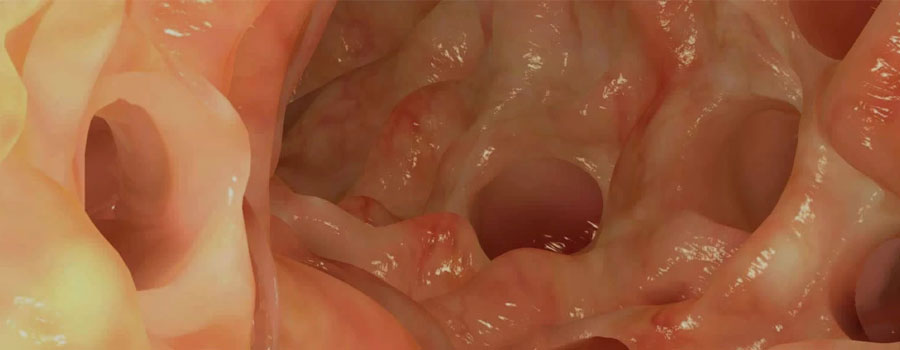
It’s not totally clear what Leaky Gut Syndrome is or how it works, which makes it difficult to determine what causes Leaky Gut Syndrome in the first place.
The internet will tell you that all of the following can cause Leaky Gut Syndrome:
- Excessive sugar intake
- Excessive use of non-steroidal anti-inflammatory drugs (NSAIDs) like ibuprofen
- Excessive alcohol intake
- Nutrient deficiencies
- Chronic inflammation
- Stress
- Poor gut health
- Yeast overgrowth
Essentially, supporters of Leaky Gut Syndrome argue that unhealthy diets, long-term NSAID use, stress, and chronic inflammation all contribute to Leaky Gut Syndrome.
Below, we’ll talk about what science says causes Leaky Gut Syndrome.
What Causes Leaky Gut Syndrome According to Science?

However, researchers have started to identify certain biological signals that could indicate a leaky gut.
First, there’s only one biological marker scientists have specifically linked to intestinal permeability: a protein called zonulin.
When zonulin is activated in genetically susceptible people, it can increase intestinal permeability and cause a Leaky Gut.
So what causes zonulin to be activated? Why would your zonulin suddenly become activated and cause a Leaky Gut after years of being healthy?
There are two factors that appear to trigger the release of zonulin, including:
- Bacteria in the intestines can release zonulin and cause Leaky Gut
- Gluten, a protein found in wheat and other grains, can trigger the release of zonulin and cause Leaky Gut
Before you jump to conclusions, gluten doesn’t seem to increase Leaky Gut in all people. Instead, gluten only seems to increase intestinal permeability in people with conditions like celiac disease or irritable bowel syndrome.
In this study published in 2006, for example, researchers analyzed how gluten impacted intestinal permeability on celiac and non-celiac cells. Researchers concluded that gluten mostly increased intestinal permeability in celiac cells.
Once zonulin gets released, however, it seems to affect both celiac and non-celiac intestinal cells equally.
In this study published in the Scandinavian Journal of Gastroenterology in 2006, for example, researchers found that zonulin gets released and increases intestinal permeability regardless of whether or not the cells have autoimmune disorders:
“Based on our results, we concluded that gliadin activates zonulin signaling irrespective of the genetic expression of autoimmunity, leading to increased intestinal permeability to macromolecules.”
Up above, we mentioned that excessive sugar intake could increase intestinal permeability and increase the chances of developing Leaky Gut Syndrome. Modern science seems to agree with that conclusion.
This study published in the Journal of Nutritional Biochemistry in 2009, for example, found that high sugar intake, particularly fructose intake, weakens the barrier of your intestinal wall, which could increase symptoms of Leaky Gut Syndrome.
This study published in Current Gastroenterology Reports in 1999, meanwhile, found that non-steroidal anti-inflammatory drugs (NSAIDs) increased the permeability of the intestinal wall, weakening the ability of your digestive tract to filter compounds:
“The abnormal leakiness of the mucosa in Crohn's patients and their relatives can be greatly amplified by aspirin preadministration… Permeability is also increased in celiac disease and by trauma, burns, and nonsteroidal anti-inflammatory drugs.”
Could excessive alcohol intake weaken your intestinal lining? Are alcoholics more prone to Leaky Gut Syndrome? This study published in the American Journal of Pathology in 2006 found this was indeed the case:
“Alcohol hepatic toxicity in heavy drinkers is associated with high endotoxin blood levels and increased intestinal permeability.”
The study discovered that patients with alcoholic liver disease had increased intestinal permeability, and that this permeability led to “excessive endotoxin passage”. In other words, your intestines were less likely to filter toxins and more likely to absorb toxins into the body.
Nutrient deficiencies also seem linked to Leaky Gut Syndrome. This study published in 2010, for example that vitamin A and vitamin D could increase intestinal permeability, for example, while this study from 2014 found that zinc had the same effect. In other words, it seems you are less likely to develop Leaky Gut Syndrome if you get sufficient levels of vitamin A, vitamin D, and zinc.
Researchers have also connected yeast to Leaky Gut Syndrome. This study from Gut in 2006, for example, found that Candida (yeast) colonization promoted hyperpermeability in the gastrointestinal tracts of mice. In other words, mice given excessive amounts of yeast were more likely to develop Leaky Gut.
Studies have also found that inflammation and stress can increase Leaky Gut, as can poor gut health. When your gut is inflamed, stressed, or in poor health, it does a poorer job of running your digestive tract. That means increased intestinal permeability, or Leaky Gut.
Ultimately, scientists dispute that Leaky Gut Syndrome is a real condition. However, numerous studies have connected various stimuli like bad nutrition, excessive alcohol use, stress, or excessive NSAID use, with increased intestinal permeability, which is just another word for Leaky Gut Syndrome.
What Diseases Are Linked with Leaky Gut Syndrome?

The internet may tell you that Leaky Gut Syndrome is the root of all modern health problems.
That’s a bold claim with little scientific evidence. However, many studies have connected increased intestinal permeability with multiple chronic diseases. People with celiac disease and diabetes, for example, seem more likely to have issues related to Leaky Gut Syndrome.
Science agrees that Leaky Gut Syndrome is linked with certain conditions such as Crohn's Disease, irritable bowel syndrome (IBS) and food allergies. Here are some of the conditions linked to leaky gut syndrome.
Celiac Disease
Celiac disease is an autoimmune disorder characterized by a sensitivity to gluten. Multiple studies have found that patients with celiac disease have higher intestinal permeability. One study found that when patients with celiac disease ingested gluten, it significantly increased intestinal permeability immediately after consumption.
Crohn’s Disease
Increased intestinal permeability could raise the chances of developing Crohn’s disease. Crohn’s is a chronic digestive disorder characterized by persistent inflammation in the digestive tract.
Researchers have noticed that patients with Crohn’s disease tend to have increased intestinal permeability, or leaky gut, than normal.
This study, meanwhile, found that relatives of people with Crohn’s disease also had increased intestinal permeability, even though they didn’t have the disease. As a relative of someone with Crohn’s disease, you have a higher risk of developing the disease.
All of this information suggests that increased intestinal permeability could be connected to the genetic component of Crohn’s disease.
Diabetes
Increased intestinal permeability could play a role in the development of type 1 diabetes. In fact, this study suggested that the immune reaction responsible for beta cell destruction could be triggered by foreign substances leaking through the gut. Type 1 diabetes is caused when your body’s immune system destroys insulin-producing beta cells in the pancreas.
This study, meanwhile, found that type 1 diabetics had significantly higher zonulin levels. Specifically, 42% of individuals with type 1 diabetes had significantly higher zonulin levels than normal. Up above, we mentioned that the protein zonulin was a significant biomarker for intestinal permeability.
In this study published in 1999, meanwhile, researchers found that rats had significantly higher intestinal permeability before developing type 1 diabetes.
Irritable Bowel Syndrome
Irritable bowel syndrome (IBS) is connected with intestinal permeability or Leaky Gut Syndrome. Specifically, patients with IBS are more likely to have higher intestinal permeability.
IBS is characterized by both diarrhea and constipation. This study found that patients with diarrhea-dominant IBS were more likely to have Leaky Gut (increased intestinal permeability). This study, however, found that IBS sufferers in general had higher incidents of Leaky Gut Syndrome.
Food Allergies
Are you allergic or sensitive to a lot of foods? Do you find yourself having bad reactions to more foods than the average person? Several studies have shown that people with food allergies may have poor intestinal barrier function: they have leaky guts, and this could cause more of the compounds within food to be absorbed.
A Leaky Gut could cause more food proteins to cross the intestinal barrier, for example, which stimulates an allergic response from your immune system. Your immune system responds to certain food proteins by releasing antigens, and antigens are a sign of a food allergy.
Does Leaky Gut Syndrome Cause Disease? Or Is It a Symptom of Disease?

One of the biggest controversies surrounding Leaky Gut Syndrome is whether it’s a cause or symptom of a disease.
Up above, we mentioned that patients with Crohn’s disease, type 1 diabetes, and celiac disease all tended to have higher intestinal permeability (i.e. Leaky Gut).
What’s not clear, however, is when the intestinal permeability developed. It’s a chicken-or-the-egg argument: did Leaky Gut Syndrome cause the disease? Or did the disease weaken the intestinal barrier and cause Leaky Gut Syndrome as a symptom?
The argument comes down to Leaky Gut supporters versus Leaky Gut critics.
Leaky Gut critics argue that intestinal permeability is a natural symptom of many chronic diseases. Any disease that causes inflammation or damage to your gastrointestinal system will weaken the intestinal barrier, causing Leaky Gut Syndrome.
Leaky Gut supporters, meanwhile, argue that Leaky Gut Syndrome occurs before patients are diagnosed with disease. Animal studies on celiac disease, type 1 diabetes, and IBS, for example, have identified increased intestinal permeability (Leaky Gut) prior to the onset of disease.
Complicating matters further is that patients with celiac disease can reverse Leaky Gut Syndrome by following a gluten-free diet. In this study, for example, 87% of people with celiac disease restored intestinal permeability to normal levels after following a gluten-free diet.
Ultimately, it’s difficult to definitively state that Leaky Gut Syndrome causes disease or vice versa.
Can You Cure Leaky Gut Syndrome?

Leaky Gut Syndrome is not recognized as an official medical disease, so there’s no official “cure” for Leaky Gut Syndrome.
Many people who suffer from Leaky Gut Syndrome also have type 1 diabetes, Crohn’s disease, celiac disease, and other conditions. In these situations, it’s best to follow the recommended treatment plan of a medical professional.
By following the recommended treatment plan, you may be able to reverse Leaky Gut Syndrome. 87% of people with celiac disease restored intestinal permeability to normal levels after following a gluten-free diet, for example.
Leaky Gut Syndrome seems connected to stressors and inflammation within the digestive tract. By identifying and removing these stressors say, gluten, you may be able to improve intestinal permeability. The answer on whether or not you can repair leaky gut depends on many factors outlined in our LGS overview. To fix gut health using leaky gut supplements is a great place to start as the cost is reasonable considering your whole body's wellness starts in the stomach and having adequate digestion and absorption of vitamins, minerals and nutrients.
Frequently Asked Questions About Leaky Gut
Q: What are symptoms of leaky gut?
A: Symptoms of leaky gut include chronic diarrhea, constipation, gas, bloating, fatigue, headaches, brain fog, memory loss, cravings for sugar or carbs, skin rashes, and joint pain. Some also experience nutritional deficiencies or poor immune system efficiency.
Q: How do you fix a leaky gut?
A: Experts recommend cutting out toxic foods from your diet, reducing stress, getting more sleep, increasing cardio activity, taking digestive enzymes, eating healthy fats, and increasing collagen consumption to fix leaky gut.
Q: What foods should you avoid if you have leaky gut syndrome?
A: Foods to avoid with a leaky gut include wheat-based products (bread, pasta, cereals, wheat flour, couscous, etc.), gluten-containing grains (barley, rye, bulgur, and oats), processed meats (cold cuts, deli meats, bacon, hot dogs), baked goods (cakes, muffins, cookies pies, pastries, and pizza), snack foods, junk food, dairy products, refined oils, artificial sweeteners, sauces, alcohol, carbonated beverages, and soda.
Q: How long does it take to heal a leaky gut?
A: Recovery time varies depending on the cause of your leaky gut. Typical leaky gut recovery times range from 2 weeks to 12 weeks.
Q: Does leaky gut cause a big belly?
A: Leaky gut can cause constipation and bloating, both of which can increase the size of your belly. There’s some evidence that leaky gut can also lead to increased fat accumulation, which could also increase the size of your tummy.
Q: Can leaky gut cause liver issues?
A: The relationship between gut bacteria and the liver is not well understood. However, researchers believe that leaky gut syndrome “probably play[s] a crucial role in liver disease development and progression”. Leaky gut syndrome leads to more bacteria crossing the intestinal barrier, which could increase the risk of liver disease.
Q: What heals a leaky gut naturally?
A: Some natural treatments for leaky gut syndrome include reducing stress, cutting toxic foods from your diet, taking digestive enzymes, eating more healthy fats, increasing collagen consumption, and getting more cardio and sleep.
Q: How do you heal a leaky gut fast?
A: Some people can heal a leaky gut in as little as 1-2 weeks by reducing stress, getting more sleep, and cutting toxic foods from their diet, among other treatments.
Q: Can probiotics help leaky gut?
A: Probiotics and digestive enzymes improve gut health, making your gut more efficient and effective, which could reduce symptoms of leaky gut. Probiotics have been shown to prevent and counteract intestinal permeability, stabilizing the gut barrier.
Q: What are the symptoms of a leaky gut?
A: Symptoms of leaky gut include digestive issues, diarrhea, constipation, gas, bloating fatigue, headaches, brain fog, memory loss, aches and pains, joint pain, skin rashes, and other issues. Some people also experience weakened immune system or nutritional deficiencies, although these symptoms may be tougher to spot.
Q: How do I detox my gut?
A: Your body naturally detoxifies your gut using your kidneys and liver. However, you can boost your body’s natural detoxification processes by cutting toxic foods, reducing alcohol consumption, and taking digestive support supplements (like enzymes or probiotics).
Q: Is coffee bad for a leaky gut?
A: Caffeine irritates the gut and dehydrates the body – similar to alcohol. When consumed in moderate doses, coffee and caffeine should not significantly impact leaky gut. However, people who drink too much coffee may be at a higher risk of developing leaky gut.
Q: Is oatmeal bad for a leaky gut?
A: Oatmeal is often recommended as an ideal breakfast for someone with leaky gut syndrome. Oats can lower cholesterol levels. Oats are also packed with soluble fiber. When paired with healthy fruits, oatmeal can be an ideal breakfast for people with leaky gut syndrome – or anyone.
Q: Does a leaky gut cause weight gain?
A: Leaky gut syndrome could cause weight gain. Leaky gut syndrome makes your intestines more permeable, which means it’s easier for certain compounds to cross the intestinal barrier. Intestinal permeability can also cause inflammation, which could lead to weight gain. Leaky gut is also associated with insulin resistance, which could increase fat deposits and put you at risk for diabetes.
Q: Can a leaky gut make you smell?
A: Some claim that leaky gut leads to bad breath and body odor. We do know that leaky gut increases bloating and gas, which could make you smell for other reasons.
Q: Is leaky gut an autoimmune disease?
A: Leaky gut is not considered an autoimmune disease, although it can lead to autoimmunity. Leaky gut can create an inflammatory environment within the body, leading to the development of many autoimmune conditions.
Q: Is apple cider vinegar good for a leaky gut?
A: Apple cider vinegar has nutrients, beneficial bacteria, and acid to improve gut health. It also contains prebiotics that can balance your gut microbiome. All of these things can boost gut health and reduce symptoms of leaky gut.
Q: Is there a test for leaky gut?
A: Doctors may perform a mannitol and lactulose test to determine leaky gut. Both tests involve water-soluble molecules that the body can’t use. A healthy test will show high levels of mannitol and low levels of lactulose. People with leaky gut syndrome, meanwhile, may have high levels of both.
Q: Can a colonoscopy detect leaky gut?
A: No, a doctor cannot determine leaky gut syndrome via a colonoscopy. The only valid medical test for determining leaky gut is the mannitol and lactulose test.
Q: Does alcohol cause a leaky gut?
A: Alcohol can damage gut bacteria and increase inflammation, triggering the development of leaky gut syndrome. People who consume excessive amounts of alcohol may be more at risk for developing leaky gut.
Q: What can I eat for breakfast with a leaky gut?
A: Experts recommend eggs, almonds, berries, bananas, dark chocolate, pineapple, kiwi, chia seeds, ground flaxseed, oatmeal, probiotic drinks, or smoothies as ideal breakfasts for leaky gut.
Q: Can I eat eggs with leaky gut?
A: Eggs are generally considered healthy foods when consumed in moderation, and evidence suggests they can improve symptoms of leaky gut.
Q: Does L glutamine heal leaky gut?
A: L-glutamine is often labeled as the best ingredient for improving leaky gut. Your body uses L-glutamine to repair the intestinal barrier. Real scientific evidence has shown that L-glutamine can improve leaky gut syndrome. In this study, for example, researchers found that L-glutamine supplementation “causes a profound improvement in intestinal barrier function” in certain patients.
Q: Is rice bad for leaky gut?
A: Some people believe that brown and white rice increases symptoms of leaky gut, which means rice may not be good for leaky gut.
Q: Are bananas good for leaky gut?
A: Bananas are rich in soluble fiber. They also contain a prebiotic compound that benefits gut bacteria. Bananas are often recommended as a good food to eat for leaky gut.
Q: Is leaky gut dangerous?
A: Leaky gut can cause bloating, gas, cramps, fatigue, food sensitivities, and joint pain, among other health issues. Some evidence suggests that leaky gut also increases inflammation and raises the likelihood of developing autoimmune disorders. Leaky gut “may allow environmental factors to enter the body and trigger the initial and development of autoimmune disease,” explained researchers in one study published in 2017.
Q: How long does leaky gut take to heal?
A: It can take anywhere from 2 weeks to 12 weeks – or longer – to heal leaky gut, depending on the cause of your leaky gut.
Q: How do you tell if you have leaky gut?
A: Symptoms of leaky gut include joint pain, tiredness, fatigue, cramping, bloating, constipation, and digestive issues.
Q: Is constipation a symptom of leaky gut?
A: Yes, constipation is a symptom of leaky gut.
Q: What supplements to take to heal leaky gut?
A: Some people take probiotic or digestive enzyme supplements to treat leaky gut. Others take fiber, zinc, collagen, or curcumin supplements. L-glutamine is also considered one of the best leaky gut supplements to take, as your body needs L-glutamine to repair the intestinal barrier.
Q: Does magnesium help with leaky gut?
A: Magnesium is a crucial mineral that your body needs for multiple processes. Leaky gut syndrome can reduce magnesium absorption, although it’s not totally clear if magnesium can help with leaky gut.
Q: Does aloe vera juice help with leaky gut?
A: Aloe vera juice can reduce inflammation and soothe your digestive tract, both of which can reduce symptoms of leaky gut.
Q: What essential oils help with leaky gut?
A: Some essential oil supporters recommend using thyme, rose, cardamom, clove, peppermint, ginger, tea tree, oregano, or fennel essential oils to help with leaky gut. However, there’s no evidence that essential oils can help with leaky gut.
Q: Is Turmeric Good for leaky gut?
A: Turmeric is a popular anti-inflammatory compound, and research suggests turmeric can help with leaky gut by reducing inflammation in the region.
Q: Does vitamin C help leaky gut?
A: Vitamin C is an antioxidant that your body needs for multiple processes. There’s limited evidence specifically linking vitamin C to leaky gut, although vitamin C can improve overall health and wellness, which could reduce symptoms of leaky gut.
Q: Does fish oil help leaky gut?
A: Fish oil may help with leaky gut. The omega-3 fatty acids in fish oil can reduce inflammation and improve digestive health. Some people take a fish oil supplement to help leaky gut.
Q: How much glutamine should I take for leaky gut?
A: Experts generally recommend taking 2 to 5 grams of L-glutamine per day to reduce symptoms of leaky gut.
Q: What causes leaky gut?
A: Environmental factors, stress, obesity, and a poor diet can all cause leaky gut syndrome.
Q: What foods damage the lining of your gut?
A: Certain foods and beverages are known to damage the lining of your gut, including alcohol, artificial sweeteners, processed foods, and any foods with high levels of saturated fats.
Q: What are the 3 foods to never eat?
A: Everyone has different diet preferences and goals, so there’s are no specific “three foods to never eat”. However, alcohol, artificial sweeteners, and processed foods are three bad foods for your gut.
Q: What 3 foods are bad for your gut?
A: Alcohol, artificial sweeteners, and processed foods can all be bad for your gut.
Q: What is the fastest way to heal leaky gut?
A: The fastest way to heal leaky gut is by switching to a healthy diet, reducing stress, reducing alcohol consumption, and getting more rest.
Q: Is oatmeal good for leaky gut?
A: Oatmeal is generally thought to be good for leaky gut. Oats can lower cholesterol levels, and they’re packed with soluble fiber. When paired with healthy fruits, oatmeal can be an ideal breakfast for people with leaky gut syndrome – or anyone.
Q: Is chocolate good for leaky gut?
A: Some experts recommend dark chocolate as a good food to eat for leaky gut. There’s no specific link between chocolate and leaky gut syndrome.
Q: Are enemas a good option for leaky gut?
A: Enemas can cause more damage to your gut over time, stripping the colon and gastrointestinal tract. However, some people recommend sparingly using enemas to aid with relief and healing.
Q: Are fermented foods good for leaky gut?
A: Fermented foods are naturally rich in probiotics, which makes sauerkraut, kimchi, kefir, and yogurt popular options for leaky gut.
Q: Can I drink almond milk if I have leaky gut?
A: Most almond milk is nutritious and good for people with leaky gut. However, some almond milk contains chemicals, preservatives, and additives like guar gum or xanthan gum as thickeners.
Q: Is butter good for leaky gut?
A: Many people recommend avoiding dairy products during a leaky gut diet – including butter. However, butter may be fine when consumed in moderation.
Q: Is coconut oil good for leaky gut?
A: Coconut oil has healthy, nutritious fats that can support healthy digestion. The best coconut oil is unrefined, extra virgin coconut oil.
Q: Is exercise good for leaky gut?
A: Exercise is essential for any healthy body to boost your metabolism, reduce stress, and aid in weight loss. Evidence suggests exercise can help reduce symptoms of leaky gut.
Q: Is juicing good for leaky gut?
A: Healthy juices may improve digestive health and reduce symptoms of leaky gut, although high-sugar juices may not be good for leaky gut.
Q: Is zinc good for leaky gut?
A: Many people with leaky gut are deficient in zinc. Zinc can be both a cause and effect of leaky gut syndrome. Your body needs zinc to make stomach acid, and stomach acid is required to start the digestive process.
Q: What’s the difference between intestinal permeability and leaky gut?
A: Leaky gut syndrome is the household name for intestinal permeability. Some researchers refer to leaky gut as intestinal permeability or increased intestinal permeability. The terms are all interchangeable.
Q: Is leaky gut connected to irritable bowel syndrome (IBS)?
A: Some believe that IBS could cause leaky gut syndrome, while others believe leaky gut causes IBS. The relationship between leaky gut syndrome and IBS is not fully understood.
Q: Can leaky gut impact my immune system?
A: 90% of your body’s immune system is found in the digestive tract. Your digestive tract plays a crucial role in filtering toxins from the body, and leaky gut can certainly impact immune system health. Many people with leaky gut also have immune system issues.
Is Leaky Gut Supplementation Right for You?

Leaky Gut Syndrome continues to be controversial. Doctors argue that Leaky Gut Syndrome isn’t real, yet multiple studies have shown that Leaky Gut Syndrome is either a symptom or contributor of various diseases. Whether the professional medical community wants to recognize LGS as a major inhibitor to sound health or not, common sense says maintaining a optimal gut flora ecosystem for your microbiome to thrive is very essential to your core's wellness as a whole.
Part of the problem comes from terminology: the internet refers to the condition as ‘Leaky Gut Syndrome’, while most scientific studies refer to it as ‘increased intestinal permeability’.
Leaky Gut Syndrome is particularly common in those with autoimmune disorders, including celiac disease and Crohn’s disease. It’s also common in type 1 diabetics. Excessive stress, NSAID use, and alcohol use also seems linked to Leaky Gut Syndrome.
Fortunately, studies have shown that Leaky Gut Syndrome could be reversible. Most people with celiac disease, for example, can improve intestinal permeability by removing gluten from their diet. Others can reduce Leaky Gut symptoms by following a healthier diet or taking probiotics.
The use of natural health supplements can greatly benefit leaky gut syndrome symptoms which could result in a complete transformation in your overall wellness and ultimately happiness. As the saying goes, trust your gut – even when its not in optimal health. Use a top quality leaky gut supplement from a quality, reputable company and see how these gut health products work for you.













![Bowflex Max Total: 2024 Fitness Workout Exercise Machine [Review] Bowflex Max Total: 2020 Equipment Review For Complete Upper and Lower Body Workout](https://www.advancedliving.com/wp-content/uploads/2019/12/Bowflex-Max-Total-218x150.jpg)



